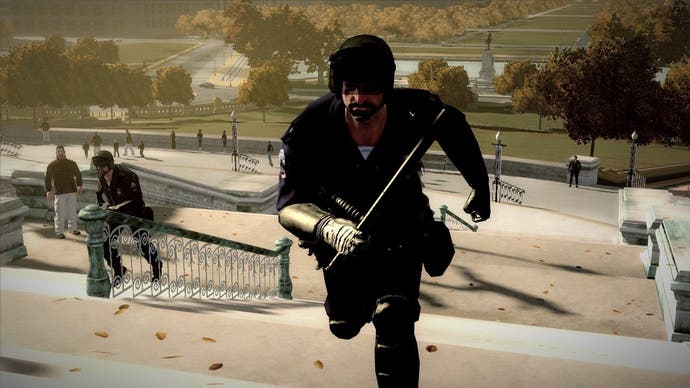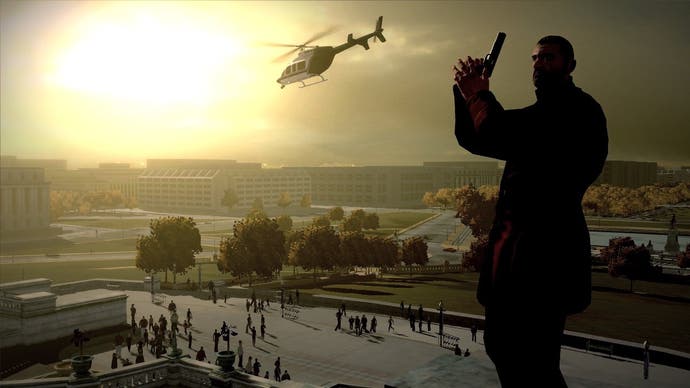Frontier's David Braben
Welcome, Commander Braben.
I think it's a breath of fresh air. But it isn't easy. The problem is, in the eighties, Frontier - or me, as it was at that point - was labelled as just doing space games. I'd done Elite, and Virus, Zarch, Frontier. That's why, with Dog's Life, I wanted to break out of those shackles. But then with Dog's Life, the Wallace & Gromit games, and the Rollercoaster games, there's a danger of being labelled as just doing games for kids. It's the label I hate, but I absolutely love the challenge: that's the important thing.
There's a danger that comes from doing the same thing over and over. I read several years ago about someone who worked in games and just did the noses on footballers: that was their job. How soul-destroying is that? And it's that in microcosm. To do different challenges is what life's all about.
Yes. We started something a few years ago called Game of the Week, and the idea at the start was that someone would present a wacky game idea on Friday afternoon, and then the rest of the company would pull it apart. It worked like that for a few weeks, but then we found that you don't always have somebody with a good idea at the right time, and then it might also clash with a deadline, so that changed a bit, but it's kept going in various forms: a forum to discuss game ideas.
And what happens is, quite often somebody presents an idea and you think, "Mmm, no, that's not all that good," but then someone else says, "But if you did it this way..." and then it turns into something quite interesting.

Absolutely. Thrillville had loads of different challenges within it, and loads of them came from that. Ironically, it can also be a victim of its own success: people might be reluctant to put their own ideas out there if they're afraid that they might be hugely valuable. That's sort of a fundamental contradiction in this industry: people want to be creative, but they also want to be a part of it.
The real thing is: it's very easy to have ideas. There are a lot of really interesting ideas floating around. The hard thing is making them work: having time to do a decent job, where you can sit down and accept criticism. We talked about making kids' games. That is a very hard thing to do, because the easiest thing to do - and I've done a lot of it, going all the way back to Elite - is making games for yourself. It's when you're making games for people who may not get things just like that, that's when you need to explain things in a slightly different way, and that's actually where it gets very hard.
One of the things that does irritate me very slightly is when people say, "Kids' games - they're just poor versions of other games." They're not! That's just how people see them, but they really, really aren't.
The real problem is that this has been triggered by the fact that educational standards have, in my opinion, fallen quite dramatically, and that's a tragedy. There are a lot of complex reasons for that. In parallel, countries like Canada are making it very attractive to head over there. So there is a brain drain - and the people coming up through the education system are nowhere near as well trained as they were five years ago. That's a huge loss and a real worry. And it's not just for the games industry. It's for any industry that's reliant on stem subjects. This is going to be a real problem for the country, not today, but in 10 years' time, when those people are becoming seniors then. And it's not worldwide: it's fairly specific to this country.

There's been quite a dumbing down. One of the problems we've had is the proliferation of courses. There are so many universities now, and the gold standard of what a university should be is getting lower and lower.
One of the reasons I became vocal about this is because of the removal of maths from a great many computer science courses. That means that many of the really important subjects that we need people to know about are then taught as black boxes: people can't understand the innards, because you need maths. So you've got people coming out of training who can use a tool, but can't do the difficult stuff under the bonnet. If you're going to do something new, you need that deeper knowledge.
That's interesting. I don't really think of them like that. From a selfish point of view, the way I see it is that with every game I've learnt something different: Elite was very much a technical piece of experimentation, I learnt such a lot from that. I essentially learnt how to program. With Wallace & Gromit, I learnt such a lot about comedy and humour which I'd never understood, just by talking to the people at Aardman. Dog's Life: getting a game to appeal to kids is a real challenge. I don't think we quite did it - we did it by degrees. But we were much more successful with things like Thrillville: young children would sit down and play the game, and you'd come back and they'd still be playing it several hours later. Without help.
David Braben is the founder of Frontier Developments, which is currently working on The Outsider and LostWinds 2 behind closed doors.
